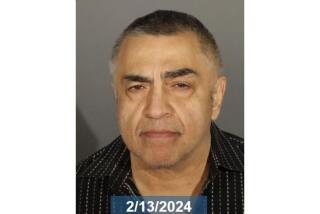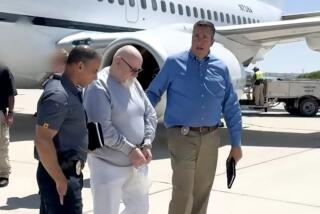Possible 13th Golden State Killer slaying mentioned in search warrant, defense attorney says
Reporting from Sacramento — The defense attorney for Joseph James DeAngelo Jr., the suspect in the Golden State Killer case, fought on Monday against the release of case documents sought by the Los Angeles Times and other media organizations.
DeAngelo, 72, appeared in court for Monday’s brief hearing, walking in on his own power and standing in a barred holding cage before the judge. In past hearings, DeAngelo was rolled into court in a wheelchair.
DeAngelo’s public defender sought to keep sealed the records that led to his arrest or delay their release until her office receives a complete list of what police took in their search. The prosecutors’ office turned over a list on Monday — but it lacks information on what investigators found on DeAngelo’s cellphone and computer.
The warrant and accompanying documents — including a statement by investigators explaining why they believe DeAngelo is behind at least 12 killings, dozens of rapes and more than 100 burglaries across the state — could shed light on how exactly investigators homed in on him as a suspect using DNA from a decades-old arrest case and a genealogy website.
Defense attorney Diane Howard argued that she is preparing for “what will inevitably be the biggest trial in California history” and that pretrial publicity will make the proceedings against her client unfair.
In an opposition brief filed to Judge Michael Sweet, Howard noted the affidavits to the search and arrest warrants total 114 pages, suggesting they contain a large volume of sensitive investigative information. Making those details public may jeopardize prosecution and influence potential witnesses, including those not yet located, she argued.
The sealed affidavits contain information on a large number of rapes and other serious crimes alleged against DeAngelo, but for which the statute of limitations has run out and he cannot be prosecuted, Howard said. It also contains information on an alleged murder prior to the Sacramento County killings, but details were not immediately available.
The Sacramento County killings are, so far, the first in the series of 12 linked to the Golden State Killer.
Howard also warned that the April 24 probable cause statement used to secure DeAngelo’s arrest included material from old investigations that if made public could contaminate the case.
“Witnesses providing the information in the affidavits did so several decades ago and may have passed away or the prosecution may not call them to testify,” her filing said.
The fact that DeAngelo wasn’t identified as a suspect until early 2018, Howard said, citing detectives’ statements, means the case is “far from over.”
She also pointed out that the innovative technique authorities used to find DeAngelo — trolling public genealogy websites and comparing the data against crime scene DNA — is mentioned only in passing in their search warrant affidavit.
In fact, she told the court, the search warrant contains only a single sentence describing the DNA process.
“Nowhere in the affidavits is there any mention of genealogical websites,” she said.
As evidence of the intense media interest in the case, Howard’s court filing included a photograph of the bank of television cameras fixed on DeAngelo at his initial arraignment. Judge Sweet had permitted as many reporters into the small courtroom as could fit, and allowed electronic recording of the proceeding. He has restricted reporters to “notes only” in all subsequent hearings, and the courtroom has had seats to spare.
But DeAngelo isn’t the only one under intense media scrutiny.
The novel DNA strategy investigators used through consumer genealogy websites for criminal investigations is fraught with questions about privacy and civil liberties. Sacramento County Dist. Atty. Anne Marie Schubert has set precedent in using DNA to identify criminal subjects in the past. She was responsible for what became known as the “John Doe warrant,” which sought evidence from an unnamed suspect based on his DNA.
At the end of the hearing, Sweet said he would revisit unsealing the warrant on May 29. Ordinarily, search warrants become public record within days of their execution.
DeAngelo is charged with the shooting deaths of two people in Sacramento and 10 more counts of murder in three other counties as part of a 1980s series of crimes attributed to a man known as the East Area Rapist and the Original Night Stalker.
In addition, investigators believe DeAngelo was responsible for a crime wave in Visalia that involved dozens of home burglaries, assaults and one killing. Authorities say DeAngelo may have begun his criminal activity as a cat burglar in Rancho Cordova in the early 1970s.
DeAngelo worked as a police officer for small towns in California until 1979, when he was fired in Auburn for shoplifting a hammer and dog repellent. He then worked for decades as a truck mechanic, living in a suburb north of Sacramento and communities that had been terrified by rapes and murders now attributed to the Golden State Killer.
On Friday, prosecutors from Sacramento, Ventura, Orange and Santa Barbara counties met to discuss where and how to put DeAngelo on trial for the slayings since the crimes cover multiple jurisdictions. No decision was made.
UPDATES:
3:40 p.m.: This article was updated with details of the search warrant.
This post was originally published at 11:15 a.m.
More to Read
Sign up for Essential California
The most important California stories and recommendations in your inbox every morning.
You may occasionally receive promotional content from the Los Angeles Times.











